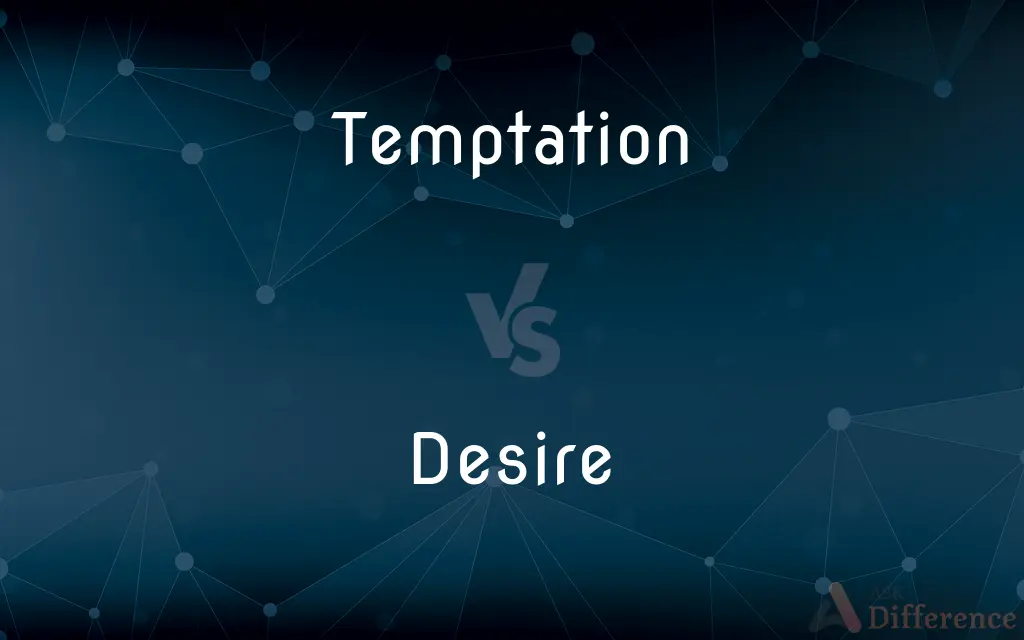Temptation vs. Desire — What's the Difference?
By Tayyaba Rehman & Urooj Arif — Updated on April 16, 2024
Temptation is an urge to do something often considered wrong, while desire is a strong feeling of wanting to achieve or obtain something.

Difference Between Temptation and Desire
Table of Contents
ADVERTISEMENT
Key Differences
Temptation typically involves the allure of something considered unwise or immoral, enticing one towards actions they might later regret, whereas desire can be a powerful motivator for personal or professional achievements, not necessarily linked with negative consequences.
Temptation is often triggered by external stimuli and may conflict with one’s values or long-term goals, while desires are usually more internal, reflecting personal aspirations or needs that align with one's values.
Individuals might struggle with temptation, experiencing it as a challenge to their self-control or ethical standards; on the other hand, desires can be more harmoniously integrated into an individual's life plans and pursuits.
Yielding to temptation can lead to feelings of guilt or remorse, particularly if the actions contradict societal norms or personal morals, whereas fulfilling a desire often leads to satisfaction and a sense of accomplishment.
Temptation can be fleeting and specific to certain situations, such as the temptation to cheat on a test; in contrast, desires might be enduring and broad, such as a desire to be successful in one's career.
ADVERTISEMENT
Comparison Chart
Definition
An urge to do something typically considered bad
A strong feeling of wanting to achieve something
Nature
Often negative or harmful
Generally positive or neutral
Source
External stimuli and situations
Internal aspirations and needs
Emotional Response
Guilt, regret if succumbed
Satisfaction, fulfillment if achieved
Example
Temptation to lie to avoid trouble
Desire to learn a new skill
Compare with Definitions
Temptation
A pull towards actions that are considered immoral or harmful.
The temptation to skip work was strong on sunny days.
Desire
A deep wish or want for personal achievement or acquisition.
Her desire to become a doctor motivated her through years of study.
Temptation
Can lead to regret if indulged.
Giving in to temptation, he later regretted his impulsive purchase.
Desire
Can be a long-term drive.
His desire to travel the world shaped his career choices.
Temptation
Often involves immediate gratification.
Temptation led him to eat the cake despite his diet.
Desire
Aligns with personal goals and values.
His desire to help others led him to volunteer regularly.
Temptation
Conflicts with personal or societal norms.
She resisted the temptation to gossip about her colleagues.
Desire
Fulfills personal or emotional needs.
She fulfilled her desire for knowledge by reading extensively.
Temptation
Is situation-specific.
Temptation arises often in situations of stress or peer pressure.
Desire
Broad and enduring.
The desire for love and acceptance is universal.
Temptation
Temptation is a desire to engage in short-term urges for enjoyment that threatens long-term goals. In the context of some religions, temptation is the inclination to sin.
Desire
Desires are states of mind that are expressed by terms like "wanting", "wishing", "longing" or "craving". A great variety of features is commonly associated with desires.
Temptation
The act of tempting or the condition of being tempted.
Desire
To wish or long for; want
A reporter who desires an interview.
A teen who desires to travel.
Temptation
Something tempting or enticing.
Desire
To express a wish for; request.
Temptation
The act of tempting.
Desire
The feeling of wanting to have something or wishing that something will happen.
Temptation
The condition of being tempted.
Desire
An instance of this feeling
She had a lifelong desire to visit China.
Temptation
Something attractive, tempting or seductive; an inducement or enticement.
Desire
An object of such feeling or passion
A quiet evening with you is my only desire.
Temptation
Pressure applied to one's thinking designed to create wrong emotions which will eventually lead to wrong actions.
Desire
(Archaic) A request or petition.
Temptation
The act of tempting, or enticing to evil; seduction.
When the devil had ended all the temptation, he departed from him for a season.
Desire
To want; to wish for earnestly.
I desire to speak with you.
Temptation
The state of being tempted, or enticed to evil.
Lead us not into temptation.
Desire
To put a request to (someone); to entreat.
Temptation
That which tempts; an inducement; an allurement, especially to something evil.
Dare to be great, without a guilty crown;View it, and lay the bright temptation down.
Desire
To express a wish for; to entreat; to request.
Temptation
Something that seduces or has the quality to seduce
Desire
To require; to demand; to claim.
Temptation
The desire to have or do something that you know you should avoid;
He felt the temptation and his will power weakened
Desire
To miss; to regret.
Temptation
The act of influencing by exciting hope or desire;
His enticements were shameless
Desire
(countable) Someone or something wished for.
It is my desire to speak with you.
You’re my heart’s desire.
Desire
(uncountable) The feeling of desiring; an eager longing for something.
Too much desire can seriously affect one’s judgment.
Desire
(uncountable) Motivation. en
Desire
To long for; to wish for earnestly; to covet.
Neither shall any man desire thy land.
Ye desire your child to live.
Desire
To express a wish for; to entreat; to request.
Then she said, Did I desire a son of my lord?
Desire him to go in; trouble him no more.
Desire
To require; to demand; to claim.
A doleful case desires a doleful song.
Desire
To miss; to regret.
She shall be pleasant while she lives, and desired when she dies.
Desire
The natural longing that is excited by the enjoyment or the thought of any good, and impels to action or effort its continuance or possession; an eager wish to obtain or enjoy.
Unspeakable desire to see and know.
Desire
An expressed wish; a request; petition.
And slowly was my mother broughtTo yield consent to my desire.
Desire
Anything which is desired; an object of longing.
The Desire of all nations shall come.
Desire
Excessive or morbid longing; lust; appetite.
Desire
Grief; regret.
Desire
The feeling that accompanies an unsatisfied state
Desire
An inclination to want things;
A man of many desires
Desire
Something that is desired
Desire
Feel or have a desire for; want strongly;
I want to go home now
I want my own room
Desire
Expect and wish;
I trust you will behave better from now on
I hope she understands that she cannot expect a raise
Desire
Express a desire for
Common Curiosities
Is giving in to temptation always bad?
Succumbing to temptation can have negative outcomes, but it depends on the context and the nature of the temptation.
What is desire?
Desire is a strong feeling of wanting to attain or accomplish something, ranging from physical objects to personal goals.
Can desires change over time?
Desires can evolve based on personal growth, experiences, and changes in one's life situation.
What is temptation?
Temptation is the inclination to engage in short-term urges for enjoyment or gain, which might be unethical or harmful.
How do temptation and desire interact?
Temptation can sometimes be a manifestation of a deeper desire but is often in conflict with long-term goals or ethical considerations.
Can a desire be negative?
While desires are generally positive or neutral, they can become negative if they lead to obsessive behavior or harm others.
How does culture influence temptation and desire?
Cultural values and norms significantly shape what is considered a temptation and what is seen as a desirable goal.
How can one manage temptation?
Managing temptation often involves self-control, mindfulness, and aligning actions with long-term goals rather than immediate gratification.
What role do temptation and desire play in motivation?
While temptation can detract from goal-oriented behavior, desire is a crucial motivator that drives individuals towards their goals.
How can understanding desires improve one's life?
Recognizing and pursuing healthy desires can lead to greater personal fulfillment and success.
How are temptation and addiction related?
Frequent yielding to certain temptations, like drug use, can lead to addictive behaviors.
What strategies help fulfill desires?
Strategies include setting clear goals, planning, persistence, and seeking support from others.
Are there positive aspects of temptation?
Occasionally, yielding to temptation can provide psychological relief or satisfaction, provided it does not lead to harmful consequences.
What psychological theories address temptation and desire?
Various theories, including Freudian psychology and behavioral economics, explore the dynamics of temptation and desire.
How can one distinguish between temptation and desire?
Understanding whether the impulse aligns with long-term goals and ethics can help differentiate between temptation and genuine desire.
Share Your Discovery

Previous Comparison
Soaked vs. Soaking
Next Comparison
Nycturia vs. NocturiaAuthor Spotlight
Written by
Tayyaba RehmanTayyaba Rehman is a distinguished writer, currently serving as a primary contributor to askdifference.com. As a researcher in semantics and etymology, Tayyaba's passion for the complexity of languages and their distinctions has found a perfect home on the platform. Tayyaba delves into the intricacies of language, distinguishing between commonly confused words and phrases, thereby providing clarity for readers worldwide.
Co-written by
Urooj ArifUrooj is a skilled content writer at Ask Difference, known for her exceptional ability to simplify complex topics into engaging and informative content. With a passion for research and a flair for clear, concise writing, she consistently delivers articles that resonate with our diverse audience.














































